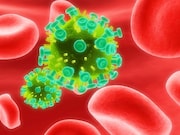HIV-positive injection drug users often have detectable viral load, participate in risky behaviors
THURSDAY, Aug. 1, 2019 (HealthDay News) — HIV-positive individuals who inject drugs are more likely to have a detectable viral load and engage in high-risk sexual behaviors, according to research published in the Aug. 2 issue of the U.S. Centers for Disease Control and Prevention Morbidity and Mortality Weekly Report.
Sharoda Dasgupta, Ph.D., from the CDC in Atlanta, and colleagues used data from the Medical Monitoring Project, which reports nationally representative estimates of clinical and behavioral characteristics among adults with diagnosed HIV, to examine high-risk injection practices and sexual behaviors among HIV-positive persons who injected drugs during the previous 12 months compared to HIV-positive persons who did not inject drugs.
The researchers found that about 10 percent of HIV-positive persons who injected drugs engaged in distributive injection equipment sharing during 2015 to 2017; nonsterile syringe acquisition and unsafe disposal methods were common. Eighty percent of HIV-positive persons who injected drugs received no treatment, and more than half (57 percent) self-reported needing drug or alcohol treatment. HIV-positive persons who injected drugs were more likely than those who did not inject drugs to have a detectable viral load (48 versus 35 percent) and engage in high-risk sexual behaviors.
“Ensuring safe methods for acquisition and disposal of syringes could decrease risks of acquiring bloodborne pathogens,” the authors write. “CDC supports the use of syringe services programs as part of a comprehensive HIV prevention strategy and provides guidance on support of syringe services program activities.”
Copyright © 2019 HealthDay. All rights reserved.








